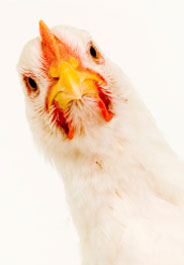
When we claim that agribusiness has largely forgotten about animal welfare in its normal operations, the comeback is always that Americans want cheap food. It will cost more to do the right thing on animal welfare.
 In 2008, The Humane Society of the United States sniffed out a scheme that demonstrated that the egg industry was not only on the wrong side of animal welfare, but also upside down with consumers. Falsely positioning itself as a defender of pocketbook issues, the industry was taking an unfair share of the dollars average Americans spend on their dietary staples.
In 2008, The Humane Society of the United States sniffed out a scheme that demonstrated that the egg industry was not only on the wrong side of animal welfare, but also upside down with consumers. Falsely positioning itself as a defender of pocketbook issues, the industry was taking an unfair share of the dollars average Americans spend on their dietary staples.
The HSUS uncovered apparent violations of antitrust laws by the egg industry's primary trade association. Specifically, in 2008, we cracked open what strongly appears to be a national price-fixing scheme that drove the price of eggs to historic highs, inflating agribusiness company profits to never-before-seen levels. In the state of Ohio alone, egg prices shot up 77 percent in 2007.
In response, The HSUS filed legal petitions with the U.S. Department of Justice and the Federal Trade Commission alleging that the United Egg Producers (UEP) -- the nation's largest egg trade association -- and its member companies created an animal welfare program in order to cover and conceal their price-fixing scheme. Shortly thereafter, egg buyers filed 21 class action lawsuits against UEP and its members alleging a similar pattern of conduct in violation of federal antitrust laws. The defendants include 13 of the country's largest egg factory farmers including Rose Acre Farms, Cal-Maine, Ohio Fresh Eggs, Michael Foods, Land O'Lakes, NuCal, and Moark.
Tracie Cone of the Associated Press reported yesterday on a major break in the case -- it seems an industry insider and former defendant, Sparboe Farms, has switched sides and handed over reams of documents and internal memos containing stunning details about the audacity of defendants' apparent greed and willingness to deceive the American public about animal welfare. Perhaps the most revealing is a 2003 letter to UEP that Sparboe wrote. It lays out the conspiracy in stark detail:
What concerns us is the "hidden agenda" of the Animal Welfare Program. In short, we believe that if not carried forward properly a strong case could be made that the Animal Welfare Program is, in essence, a program being offered by our trade association and its members to reduce outputs in an effort to increase prices. Naturally that strikes of price fixing to us and we have concerns about future claims of this sort being made against the association and/or its members.
In other words, the so-called animal welfare standards established by UEP not only were introduced to thwart actual substantive reforms advanced by The HSUS and other animal welfare groups, but these standards apparently had an additional hidden component: they provided a method of supply control that UEP could leverage in order to inflate prices. That's right, according to the complaint in the class action suit, egg industry leaders squeeze birds into small cages, and then squeeze American consumers through anti-competitive practices, while falsely and brazenly representing themselves as defenders of American consumers against the modest reform efforts of animal advocates. That's the very definition of duplicity.
Yesterday, The HSUS requested that U.S. Attorney General Eric Holder initiate a criminal price-fixing investigation into this scandal -- the latest in a long string of scandals for an industry that just can't seem to do right by either consumers or animals.
This industry continues to say it warrants public confidence. But the latest revelations in the price-fixing case, as well as our latest undercover work at two of the largest egg factory farms in the nation, show that industry self-regulation has failed in the most fundamental of ways.
This post originally appeared on Pacelle's blog, A Humane Nation.
